I am not the best Game Master, by any means. I have met and played under many people that put me to shame. That said, I have run multiple entertaining and, in the end, satisfying campaigns. I believe I am pretty darn good at running a role-playing game.
Being a Game Master (or Dungeon Master, Storyteller, Game Judge, referee, etc.; GM from here on out) is work. Sure, you might be in a session for a few hours, but for each hour that session lasted, I would say a good GM spent an equal amount of time or more preparing things. Unless you are running a purely hack-and-slash game (nothing wrong with that), there are a multitude of things of which the GM needs to keep track, storyline adjustments that need to be made based on the actions of the player characters, and so on. The work of the GM started before the player characters were even conceived! World building is an amazing, rewarding, and fun thing to do. To do it well takes time and effort.
It can be very hard to build and run a world where the players can complete epic quests. It is even harder to do it in such a way that feels organic and gives the players agency.
Fortunately for you, I have six books that can jump-start your brain and get you moving in the right direction! The first three are books of advice for running games; the last three are books that spark ideas and get the creative juices flowing. Each of these books offers insights and information that is of value. The relative value of each book will depend greatly on the style of game you play, and the rules you use. That said, each of these books offers far more than the obvious!
#1: Robin’s Laws of Good Game Mastering
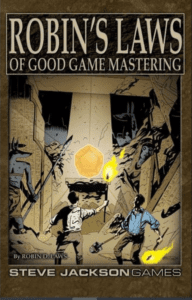
The good folks over at Steve Jackson Games know a thing or two about role-playing. It is no surprise that they would have a book that aims to help the GM in their pursuit of gaming Nirvana. Robin D. Laws is an amazing author of role-playing material, having written everything from adventures to supplements to settings to whole role-playing systems. His work is always interesting and often flies in the face of convention (if you have not read GURPS Fantasy 2: Adventures in the Mad Lands, you are missing out on one of the most original fantasy settings ever created). Is it any wonder that Mr. Jackson would tap this guy to write a book of game mastering advice?
The book starts with an amazing essay called “The Great, Immutable, Ironclad Law” which I will not divulge here. You need to go read this for yourself. The remaining chapters cover:
- Knowing Your Players
- Picking Your Rules Set
- Campaign Design
- Adventure Design
- Preparing to be Spontaneous
- Confidence, Mood, and Focus
- Improvising
Before it brings it all together in another amazing essay called “A Final Word on the Ultimate Dilemma” which I will also not spoil in this article.
The entire book is only 36 pages (if you include the inside and outside of the cover) and has not one column-inch of wasted space. Every word in this book is a bountiful treasure for the aspiring GM, as well as the old grognard who thinks they knew it all before they picked the book up.
Get a copy of this. Today.
#2: Gamemastering Secrets
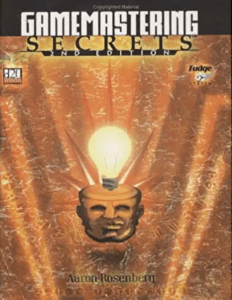
Grey Ghost Press is best known for publishing the FUDGE System. Still, a couple of more generic books on role-playing are in their library. One of these is Gamemastering Secrets. This book introduces you to the world of being a GM. It covers most every skill you need to practice in order to be successful. The first few chapters cover:
- Quick Tips
- Things to do before the game starts
- Things to do as you start the game session
- Things to do as you run the game session
- Things you do as you close down the game session
Then, the final chapter is a collection of short (2-6 page) articles giving advice from a series of amazing guest contributors. These articles include:
- Gamemastering for children
- The beginner’s game
- Mapmaking
- World-building
- How to wing-it at the table
And so much more. If you are new to being a GM, or want to improve and hone your skills, this book has a lot you can use.
#3: X-treme Dungeon Mastery
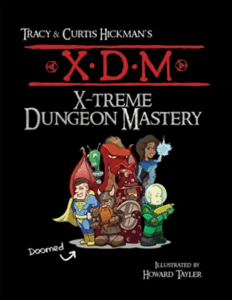
This book has a lot that screams: do not buy me!
The cover comes off as confrontational (illustrating a group of adventurers and describing them as doomed). The first few pages are written with a style that comes across as a bad mix of we are cooler than you and we know it and look at the jokes — the jokes! — if you are not laughing you suck.
However, once you can get past this, the book is good. No… not good, it is fantastic. So step one in enjoying this book and getting the most from it: skip the first 22 pages. The following sections contain an ongoing discussion of the theories of extreme dungeon mastery — more accurately called good game mastering. The topics covered include:
- Player types and what they want from a role-playing game
- How to apply narrative (story) and allow it to drive the game forward
- How to design and implement effective puzzles that feel a natural part of the game’s environment
- Game master preparations
- Keeping the action moving; avoiding dry spells in the game
- Establishing the proper atmosphere
- Themes, props, and stunts
- Being a good player
…all before it devolves back into uselessness around page 119. Look, the cooler-than-thou attitude and in-your-face jokes are all through the book. Pages 1-22 are so full of it, there is no room for anything else. Pages 119-160 are not nearly as bad (and have some decent material). But it all becomes heavy handed again. That material from page 23 to page 118, though? Pure gold.
#4: GURPS Timeline
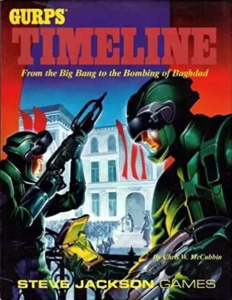
Chris W. McCubbin is an excellent author who has written several books for Steve Jackson Games’ GURPS system. One of his best was GURPS Aliens. If you find yourself in need of some very cool non-human species with a strong sci-fi flair, this is an excellent book and I highly recommend it.
GURPS Timeline, a book that was written with time travel games in mind, turned out to be far more valuable than it first appeared. I believe this book is a far better resource than anyone considered when the book was pitched. The book describes itself as a collection of seeds; these seeds are ideas that can be used to grow adventures or even whole campaigns. Many involve the concept of the McGuffin (see below). So what sorts of seeds will you find in this book?
All sorts. The book covers the history of the world from The Big Bang, the formation of the solar system, and the origins of life… all the way to 1992 and the first Gulf War. For the GM, this book has more ideas for adventures and campaigns than any other book I have ever seen! Sure, one can look at a giant history text and pull from it ideas for stories. But this one outlines history and pulls from it some of the greatest stories that have taken place in history, and presents those stories in a way that illustrates and highlights their capacity to be used in a role-playing game. In other words, this is world history distilled with an eye to gaming, making the application of that information as straightforward as possible.
Some example seeds include:
- Huang Ti and the Chinese — a look at the formation of the Chinese Empire, the only ancient empire that has survived until present day.
- Phoenicia — a brief look at a relatively advanced ancient civilization that never coalesced into an empire or even a unified nation.
- The Death of Alexander — do you have a powerful warrior in your game that laughs at ancient gold dragons and eats Kraken for breakfast? Remind him of how the greatest conqueror in history succumbed to indigestion.
- Pope Joan — for 700 years, the official record of the Vatican stated that a woman from England reigned as Pope. The story of this woman is too fascinating to ruin with a one line summary here.
- And so on.
Want to know the story of 15,000 Blind Bulgarians? How about the story of the Order of the Rosy Cross? The Roanoke colony? The Merovingian Kings? How about why a large group of most terrible people, if they could, would want to travel to the year 1809? I do not care if you are a historical gamer, fantasy gamer, sci-fi gamer, or just a history buff. You need this book.
McGuffin
McGuffin (noun): a plot element which has no bearing on the story other than to drive it forward. See also deus ex machina.
Coined by Alfred Hitchcock, a McGuffin is really nothing at all. The most famous example is the top-secret-strategically-vital document of which some unwitting fool manages to come into possession (e.g., North by Northwest). What the document says, who it is for, or why the protagonist has it is all of little concern. The existence of the document is what is important because this allows us to suspend disbelief as one or more blood-thirsty organizations now spend the rest of the story hunting down the poor fool in an attempt to regain this document at any cost. As Hitchcock said: “It is the mechanical element that usually crops up in any story. In crook stories it is almost always the necklace and in spy stories it is most always the papers.”
#5: The Primal Order
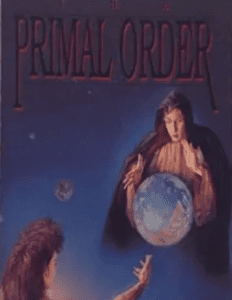
Back before the little startup game company in Washington state called Wizards of the Coast discovered that printing trading cards could be as profitable as minting your own cash, they released a book called The Primal Order. This book is about gods.
Sure, every fantasy role-playing system that includes such beings has some treatment of them. TSR released Deities & Demigods for Dungeons & Dragons. However, TSR missed the point of such powerful beings: they are not just powerful, they are different.
Where Dungeons & Dragons handled Gods as 400 hit-point monsters with some cool powers, The Primal Order introduces primal energy — a force that divine beings (and a few lower powers) tap into, harness, and project which renders them beings far and above the power of mortal men. If a godling casts a spell and laces it with primal energy, no saving throw, no magical defense, no anything (with the exception of more primal energy) is going to stop this spell from striking true and having the maximum possible impact.
The rules presented are in a system Peter Adkison wrote which allow it to be translated into other systems with relative ease. That was the idea, anyway. Some systems work better than others for translating this much power; a few should probably avoid defining such beings in terms used by normal, mortal characters. Still, using the system as written will allow the GM to determine who wins between a couple of primal beings. If your game is to have gods, arch-devils, members of the Q-continuum, or other nearly-omnipotent characters, you cannot go wrong by getting yourself a copy of this book.
#6: Fantasy Wargaming: The Highest Level of All
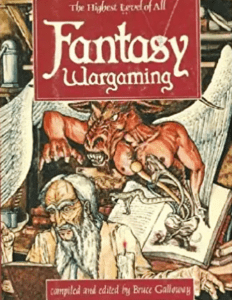
Before I start describing this book, a word of warning:
With that out of the way, let’s look at why this is a book you need.
Fantasy Wargaming is a collection of essays written for GMs and players of role-playing games to explain and describe how the times often emulated in various gaming systems actually worked. The idea behind these articles was to elevate understanding, to infuse proper motive and logic into the games we play. Chapters include:
- City, Court, and Country — explaining how land is the foundation for everything in feudal societies. How does this impact society? How does this lay the foundation for the local and regional economy? So much more…
- Myth, Magic, and Religion — explaining how religion and its institutions impacted day-to-day life in medieval times. What role did religion and magic play in the lives of peasants? Nobility? The Church? What was the disconnect between reality and belief?
- The Book of Physiologus — explaining the sorts of wildlife that existed (and was believed to exist) in these ancient times. What sorts of undead did different regions believe roamed their cities? What sorts of faeries did they believe roamed their countryside?
- Mortal Combat — explaining the weapons, armors, castles, and defenses of the various ages, and why they were developed. After all, you do not get the development of a weapon like a mace without a need — in this case, plate armor. So if you want to create realistic soldiers, you need to know what they carry; and to know that, you need to know what they are fighting.
- Moorcock and More — explaining how to translate your favorite fiction into your favorite game system.
- The Complete Enchanter — explaining how to take the previous five chapters and put them together into a cohesive whole.
The 75 pages these chapters represent are filled to the brim with great advice and thoughts on how to structure a campaign. Chapter 7 — as indicated above — begins a game system that, for the life of me, I have no idea why anyone would include. Strangely, buried within this pile of excrement are some amazing gems. Useful items within the remaining pages include:
- Astrological Influence (p77) — there is a chart which shows how the sign a character was born under impacts their attributes. This is usable with a wide variety of games.
- The Bogey Table (p81-82) — here we get a table of the sorts of things that can hinder or enhance a character. Some of these are not in keeping with modern morality, but reflect the morality of most societies of old Christendom; sometimes this can be an eye-opener.
- Social Classes (p85) — ever get confused with what title is above or below what other title? How about the relative authority carried by a person with a title of Nobility (Barron) vs. a title of the Church (Bishop) vs. a title of the common classes (Lord Mayor)?
- Money (p87) — ever wonder what the forms and denominations of money actually used were? Seems odd that everything in most fantasy games is in some form of gold-pieces when most peasants would never see a piece of gold in their lives…
- Hit Locations (p101) — need a good table for what part of the body your blow just landed upon?
- Equipping a Warrior (p115-120) — a look at various ages and locations and what a typical warrior of that age/location would be carrying.
- More Astrology (p125-126) — how do astrological signs impact magic?
- Piety and Impiety (p150-169) — how do your actions impact your relationship with the divine and infernal?
- Higher and Lower Powers (p170-179) — where does Michael rank in the Christian hierarchy? Just how powerful is this guy? How about Lucifer? The Virgin Mary? Your typical imp?
- and so on…
There really is more useful content in this book included by accident than most books attempt to cram in.
Is There More To This?
Over at a humble website called Swords & Dorkery, by Mike Monaco, there exists a (rather lengthy) article about this book called Bruce Galloway’s Fantasy Wargaming. I know it is a lot to read, but it is very much worth it. In this article, he describes the history of the book, the campaign that was played by way of playtesting some of the concepts within the book, and (most importantly) how the various articles I describe above were meant to be seen as part of the rules as presented in chapter 7.
He breaks this article into several sections:
- I. The history of the project (a timeline of the book’s development)
- II. Leigh Cliffs and Fantasy Wargaming (the campaign that shaped the book)
- III. Cover to cover (a chapter-by-chapter look at the contents of the book)
- IV. Supplementary material (a look at resources that can aid with the book)
Honestly, if there is anything you want to know about this book — before or after you buy it — then this article has it.
In Conclusion
All of these books have flaws; some more than others. But they have information that can be pulled out and used in any game system. They are generally well written, very enjoyable, and quite fun. Each will give you something that can be used to make your game better – to make you a better Game Master.


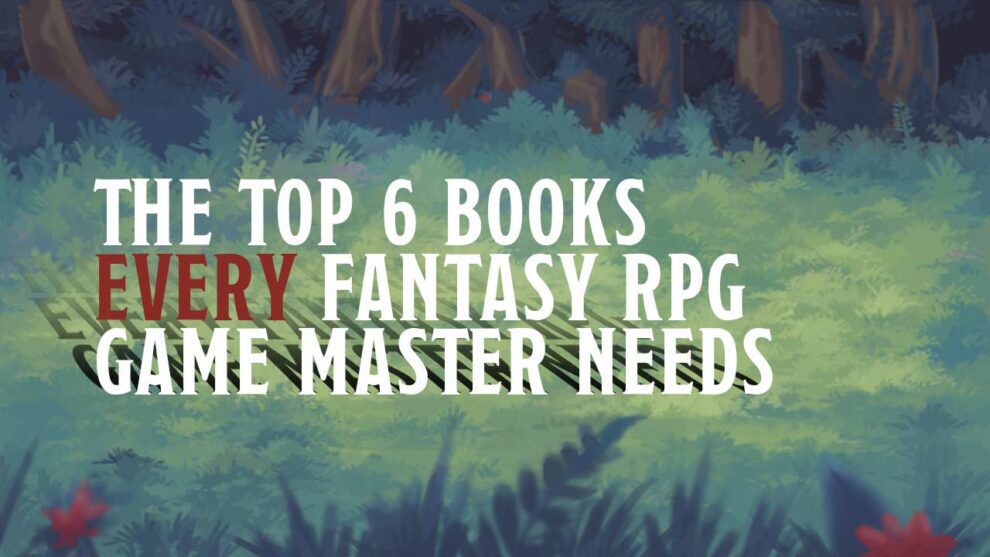

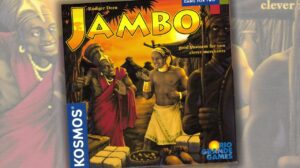



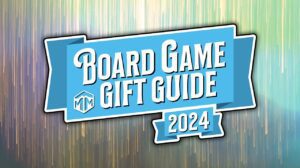


Add Comment